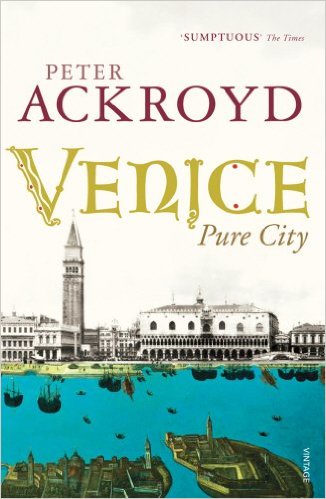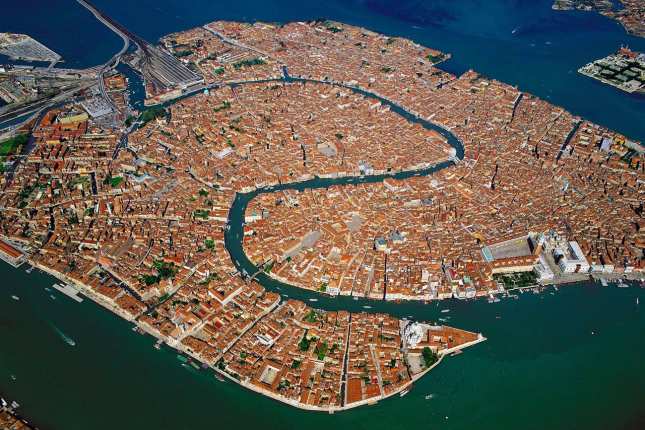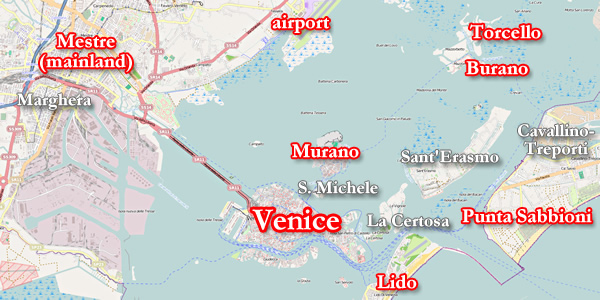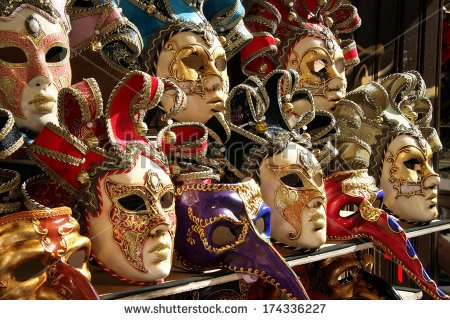The book is an elegant and languid meditation on the city of Venice, the one in Italy not the one in California. It tells the story of Venice through thematic chapters rather than a sequential history. The chapters run ten to twelve pages, easily digestible in a sitting, and the segues from one to another and within each are smooth as the surface of a pond on a still day. Without a doubt the man can write. The book is replete with watery images, metaphors, comparisons, similes, and tropes. I felt moist reading it at times.

A sample of the chapters includes; Origins, Trade, Refuge, Stones, Chronicles, Secrets,…..
Leaving aside a myriad of details, the heart of Venice was and is trade. It made itself an entrepôt for more than a thousand years. Having no wealthy terra firma, having no mineral riches, having no vast population, it lived by wit, barter and trade. It became the European end of the Silk Road. The merchants Shylock funded sailed into the Black Sea and along the Levant coast to bring back to Venice the luxuries of the East and sold them in trade fairs in Venice. The first Venetian carnivals were commercial expositions.
During its long ascendancy, when violent change was the norm in other polities, precipitated from within by ambitions or ideologies or from without by invasion, Venice remained stable. The city lived with the constant threat alta aqua, which made Venetians pull together, however much they grumbled, like no others at the time. Until Napoleon in 1804 joined it to the Italian kingdom he created for his brother it had stood apart from one and from all. Having no choice Venice reluctantly and slowly became a part of Italy. Earlier when Niccolò Machiavelli rhapsodised of a future Donna Italia he did not include Venice in it, and in this he was not alone seeing it as an enemy of Italy, not a part of it.
In Venice the commercial imperative reduced everything to a contract, and copious records were kept which miraculously survived despite many catastrophes natural and human that often destroy the past. Ackroyd has immersed himself in the dry and dusty ledgers when not walking the campi and picked out some very apposite instances for the reader.
Venetians were traders for whom the sea was the highway. They bought cheap and sold dear and on the margin prospered. Though the merchants were private businesses, their activities were supported, encouraged, promoted, and taxed by the commune as a whole. To specify, the ships were built and owned by the commune and rented to merchants complete with crews. There is a parallel here to George Pullman and his famous railway cars, which are treated in another review on this blog.
Because of the historical and ever-present threat of the water the communal spirt ran deep, and lasted longer even in the age of Enlightenment individualism. In Venice the whole comes before the one. Else everyone drowns. The comparisons to Amsterdam are many.

Like many others he is impressed by the Venetian drive for order and regulation, the more so in the face of repeated Venetian corruption, extortion, embezzlement, and fraud. Shylock was the least of the problem for most merchants of Venice. Ackroyd is absolutely deadpan in the chapter called ‘Merchants of Venice’ in which he does not mention William Shakespeare and his Venetian play. If he did, I blinked. Earlier he does mention Venice’s most famous literary tourist, Gustav von Aschenbach from Thomas Mann’s mediation on life and death … in Venice.
Everything was put down on paper, moreover, everything was kept totally secret. There is the paradox, everything was recorded, included the energetic informing on each other that kept the authorities busy processing, but nothing was said. Ackroyd cites some remarkable examples of the ability of Venetians to keep secrets. They make all those Stasi agents in the Deutsche Demokratische Republic (DDR) look like blabbermouths. There are many, and to this reader, surprising comparisons to be made between the DDR and Venice in matters of secrecy, security, and surveillance and the high cost of such social control.
In the case of Venice the campi — the residential squares — made surveillance unavoidable even for those few who were not interested in spying on their neighbours, and easy for the great many others who were interested. One result is the hidden doors of many houses, so placed to avoid prying eyes. Another result was the mask and cape.

Yes, there is a ‘but’ coming. The book is all trip and no arrival. Though each theme is treated clearly and simply, this reader lost impetus. Without a sequence of events the reader has no characters upon whom to focus or chain of events to follow. Of course, the author’s choice to do that puts all the focus on the city of Venice and Ackroyd’s considerable powers of persuasion, and it kept me reading.
‘Doge’ is a dialect corruption of ‘duke’ and they come and go but none move the story on. Doges were invariably elevated at an advanced age, say seventy-two, and some then continued for another twenty years. There was an unbroken line of one hundred and twenty doges until Napoleon brought the Enlightenment on the bayonets of his army. The regime, in the terms of comparative politics, was authoritarian, oligarchic, patriarchal, and gerontocratic. That is for those who suppose labels are explanations. Napoleon, extracting a huge tribute from Venice, had the Golden Book of the Doges publicly burned. It was the genealogical register of the ducal families, the clan that sired the succession of doges, and its destruction completed the rupture with the past.
Venice was a republic; it did not have hereditary monarchs, though successful and powerful families strove for dynastic succession, and it did not have a feudal past in which a few owned the land and the landlord owned most people. The social strata were thus not the hard sediment they became elsewhere, but they hardened over the millennia. No gondolier ever became doge and no scion of the Golden Book ever poled a gondola.
Its foundation, existence, continuation, wealth, and stability depended on trade over the seas, and that trade required a great many skilled artisans to build, maintain, and repair the ships that were rented to merchants. The importance of these skilled craftsmen gave them more leverage in Venice than in many other comparable places. It is easier for the workmen at a single shipyard, the Arsenal, together to make their displeasure known than for an equal number of peasants scattered over vast estates to do so. See Gdansk in Poland for further confirmation.
The pages of the Golden Book represented about four percent of the population and the mercantile strata added another six percent, leaving the ninety percent out of the political, social, and financial elite. Those of the Golden Book tried hard to marry only within its own small ranks, and the merchants married their own kind when not trying to marry up. The total population in its prosperous times numbered about 100,000, more than it does today,
As with cities like Florence in the Fifteenth and Sixteenth Centuries, the government of Venice was complicated and convoluted, by design, not by accident. When problems arouse a committee to act on it would be created and it would inevitably perpetuate itself in the first law of administration — goal displacement — revealed in 1957 by Philip Selznick in ‘Leadership in Administration.‘ There grew an encrustation of such committees with vague and overlapping remits, that never seemed to lapse. They often worked in ignorance of each other even when they had overlapping membership the law of secrecy applied. While laws were written, they were never codified and seldom promulgated and enforced only when necessary. It sounds very much like a university Department’s approach to self-government in the days when that was tolerated.
This open texture might seem to offer many opportunities for citizens to play one committee off against another, as is commonplace today in organisations, but not so in Venice, because the existence of most of these committees was secret, so secret that other committees with exactly the same terms would be created anew, and all of their activities were secret, too, including from each other.
Of course, there was no written constitution that spelled out anything. Some of that may remind a reader of working in a large organisation without an organisation chart, and no reporting. Yet everything is recorded. Ahem, see the passing remark above about a university department.
In a way, though prima facie more formal with its archive, it reminded me of the rule by talk in Colin Turnbull’s ‘The Forest People’ (1961) where every instance is treated as unique and talk, talk, talk until the antagonists prefer to give way than talk anymore, like those self-governing co-operatives in the 1970s where everything was done at all-staff meetings that went on, and on, and those who persisted eventually got their way. It was self-management by verbal attrition. Compared to this, McKinsey management looks better.
The Venetian mask a perfect metaphor for the pure city. It is ‘pure’ by the way because it had for most of its history no hinterland with apologies to Padua. It was all city and nothing else. While Florence had a rich agricultural land in its domain, where the Medici family raised beef cattle that still grace the plates of Italian cuisine, Venice had only itself and the lagoon.

In Venice care was taken to be sure that the archivist was either blind or illiterate so he could not read the files, unlike Connie in the John Le Carré Cold War novels. The files might be sequestered but Connie knew what was in them despite the sealing wax. The files might be altered but Connie forgot nothing. Corporate memory resided in one sodden pensioner.
That passing mention of Padua reminded me that Venice has another connection with Machiavelli. Cardinal Reginald Pole who broke with Henry VIII spent an exile in Padua where he became aware of Machiavelli’s ‘The Prince’ and wrote a condemnation of it, though it is doubtful he read it. Since King Henry’s confident Thomas Cromwell had earlier spent time in Italy, Pole supposed that he learned his sins from Machiavelli. Association is poor proof of cause and effect, but this tenuous thread is woven into Hilary Mantel’s Tudor novels.
Today Venice remains a city of trade, and its trade is with tourists who come to it as if the whole city is a continuous exposition. Venice remains an entrepôt and the product it mow sells is itself. The tourist Venice, the Venice a tourist sees is Venice, he concludes.
While Ackroyd’s impressionistic tour refers to the mysteries and crimes of Venice the dedicated krimi reader turns to Donna Leon for detail.
 Peter Ackroyd from the dust jacket.
Peter Ackroyd from the dust jacket.
This book is all trip and no arrival. It meanders here and there and Ackroyd is a superb cicerone.
Skip to content
